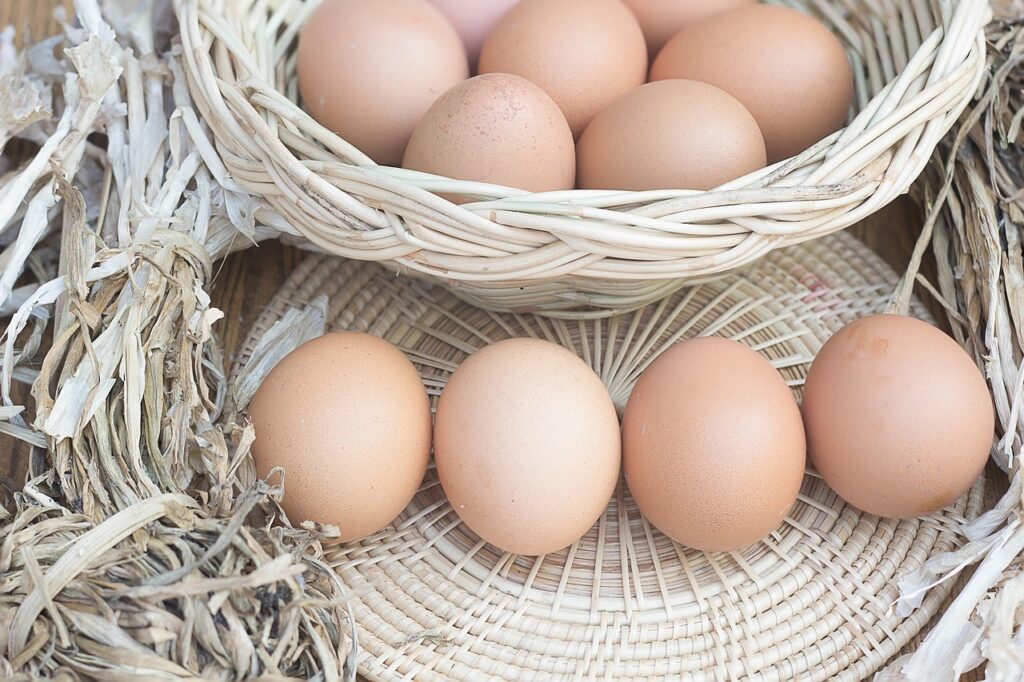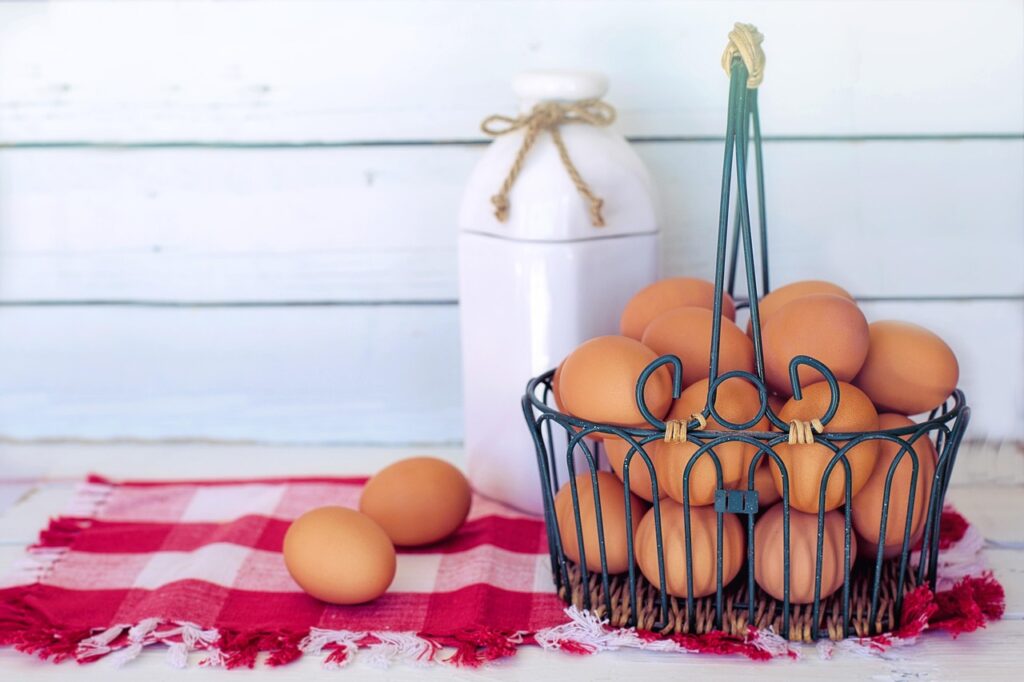Introduction
Eggs are a staple in kitchens worldwide, but one question persists in every household: how long are fresh eggs good for? Whether you buy from a grocery store or a local farm, knowing how long you can safely consume eggs is crucial to avoid foodborne illness and waste. In this comprehensive guide, we’ll break down storage durations, tips for testing freshness, and key USDA guidelines to keep your eggs safe and delicious.

Image by Adriano Gadini from Pixabay
Understanding Egg Freshness
Freshness in eggs doesn’t just refer to taste—it’s directly tied to safety, nutritional content, and texture. The egg white (albumen) and yolk degrade over time, becoming runnier and less ideal for cooking or baking. While eggs don’t spoil as quickly as perishable meats, they’re still vulnerable to bacterial contamination if not stored properly.
How Long Are Fresh Eggs Good For? (Room Temp vs Fridge)
At Room Temperature:
- Unwashed farm-fresh eggs: 2 weeks
- Washed or commercial eggs: No more than 2 hours (per USDA)
In the Refrigerator:
- Raw eggs in the shell: 3 to 5 weeks
- Raw eggs out of shell: 2–4 days
- Commercial pasteurized eggs: up to 45 days
USDA Guidelines on Egg Storage
The United States Department of Agriculture (USDA) recommends:
- Refrigerating eggs at 40°F (4°C) or below
- Avoiding washing store-bought eggs (they’re pre-washed)
- Using eggs within 3 weeks of purchase for best quality
Farm Fresh vs Store-Bought Eggs
| Factor | Farm Fresh | Store-Bought |
| Washed? | Usually unwashed | Washed and sanitized |
| Shelf life unrefrigerated | Up to 2 weeks | Unsafe after 2 hours |
| Shelf life refrigerated | 3–4 weeks | 3–5 weeks |
| Flavor | Often richer | Neutral |
Farm fresh eggs with their bloom intact last longer at room temperature. Washing removes this protective coating.

How to Tell If an Egg Is Still Good
Use the senses:
- Smell: Rotten eggs emit a sulfurous, unmistakable stench.
- Appearance: Blood spots = fine. Green/black = toss it.
- Sound: Shake the egg. Sloshing suggests it’s gone bad.
The Float Test: Myth or Method?
Place the egg in a bowl of water:
- Sinks & lies flat: Fresh
- Stands upright: Use soon
- Floats: Discard
The float test works due to the air cell growing over time. It’s a great backup when dates are faded.
How Temperature Affects Egg Shelf Life
Temperature swings speed up spoilage:
- Ideal: 40°F (4°C)
- Danger zone: 40–140°F (4–60°C)
- Heat causes the yolk to thin, increasing risk of salmonella
Store eggs in the coldest part of the fridge, not the door.
How Long Are Eggs Good For After Expiration Date?
- Sell-by date: You still have about 2–3 weeks.
- Best-by date: Eggs can often be used for up to 5 weeks after packing.
- If unsure? Use the float or smell test.
Egg Storage Tips for Maximum Freshness
- Keep eggs in the original carton
- Store in the back of the fridge, not the door
- Avoid washing farm eggs until ready to use
- Label with purchase date
- Don’t freeze in shells (use ice cube trays for raw eggs)
Can You Freeze Fresh Eggs?
Yes—but:
- Crack and beat before freezing
- Add a pinch of salt or sugar to stabilize texture
- Store in airtight containers for up to 1 year
Frozen eggs are best for scrambles and baking, not delicate recipes like poached eggs.

Image by Buy me a coffee, please Buy me a coffee, please from Pixabay
How Long Do Boiled Eggs Last?
| Type | Fridge Life |
| Hard-boiled (shell on) | 7 days |
| Hard-boiled (peeled) | 4–5 days |
| Soft-boiled | 2–3 days |
Always cool eggs before refrigerating and store in sealed containers.
igns of a Spoiled Egg You Should Never Ignore
- Strong odor (rotten or sulfur)
- Discoloration inside the egg
- Slimy shell (bacterial growth)
- Excessive float in water test
When in doubt, throw it out.
Safe Egg Handling Practices
- Wash hands after handling
- Clean utensils and countertops with hot, soapy water
- Cook eggs to 160°F (71°C) for safety
- Avoid raw eggs in high-risk recipes (e.g., homemade mayo)
How Long Are Pasteurized Eggs Good For?
Pasteurized eggs last:
- Refrigerated: 10–15 days longer than conventional eggs
- Opened carton: Use within 3 days
- Ideal for recipes needing raw egg (e.g., Caesar dressing)
Organic Eggs vs Conventional: Any Difference in Shelf Life?
Surprisingly, no.
- Shelf life depends more on storage and processing
- Organic may have better animal welfare, but storage durations are similar
Always follow the same freshness tests and refrigeration protocols.
Egg Storage Containers: Are They Worth It?
Yes, if:
- You want airtight freshness
- You prefer stackable storage
- You’re organizing a homestead kitchen
But always label dates to avoid confusion.
How Long Are Washed vs Unwashed Eggs Good For?
| Type | Room Temp | Fridge |
| Unwashed (farm) | 2 weeks | 3+ weeks |
| Washed | Unsafe | 3–5 weeks |
Washed eggs need refrigeration. The bloom on unwashed eggs acts as a natural barrier.
How Climate Affects Egg Storage Duration
- Hot, humid climates: Eggs spoil faster
- Dry, cool environments: Prolong shelf life
- Use refrigeration or cold storage if ambient temps exceed 70°F
FAQs
1. Can you eat eggs 2 months out of date?
Possibly, if stored correctly and passed freshness tests—but it’s not recommended.
2. Do eggs go bad in the fridge?
Yes, but much more slowly. Use within 3–5 weeks.
3. How do I store eggs from backyard chickens?
Don’t wash until use. Store in cool, dark place or fridge.
4. Why do European eggs last longer unrefrigerated?
They’re often unwashed, preserving the protective bloom.
5. Are brown eggs fresher than white eggs?
No—shell color doesn’t affect freshness. It’s all about storage and handling.
6. Can I still use eggs with blood spots?
Yes! Blood spots are harmless and safe to consume.

Image by Jill Wellington from Pixabay
Conclusion
So, how long are fresh eggs good for? The answer depends on whether they’re washed, how they’re stored, and if you’ve kept them cold. With proper handling, fresh eggs can last up to 5 weeks in the fridge, while unwashed eggs can safely stay on your counter for about 2 weeks.
Use your senses, follow USDA recommendations, and don’t be afraid to toss any eggs that seem suspicious. A little caution goes a long way in preventing foodborne illness and maintaining egg-cellence in your kitchen.
